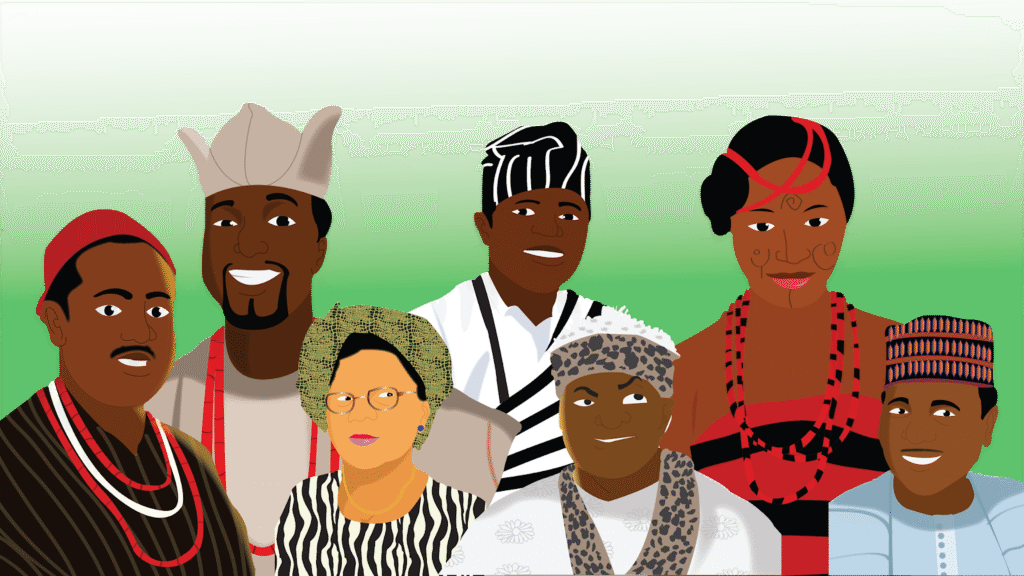Discover how mixed cultures in Nigeria foster unity in diversity. Explore the blend of food, language, fashion, religion, and traditions that shape Nigeria’s cultural identity and national harmony.
Introduction
Nigeria is a country where diversity is not just a fact it is a way of life. With more than 250 ethnic groups, speaking over 500 languages, and practicing different religions, Nigeria could easily be divided by differences. Yet, what makes the nation remarkable is how these cultures often blend, overlap, and influence one another to create a shared Nigerian identity. This cultural fusion is what we call unity in diversity.
The Meaning of Mixed Cultures in Nigeria
Mixed cultures occur when people from different backgrounds interact, exchange values, and adopt aspects of each other’s traditions. In Nigeria, this has been happening for centuries due to trade, migration, intermarriages, and urbanization. Instead of existing in isolation, ethnic groups continue to borrow from one another, shaping a unique and dynamic cultural identity.
How Mixed Cultures Influence Nigeria’s Society
- Food: A National Bond
Food is one of the strongest symbols of Nigeria’s cultural blending. While some dishes are rooted in particular ethnic groups, many have spread far beyond their origins.
- Jollof Rice: though originally a West African dish, is now Nigeria’s signature meal enjoyed nationwide.
- Suya and kilishi: a spiced meat delicacy from the Hausa, is eaten across the country, regardless of ethnicity or religion.
- In modern Nigerian homes and restaurants, it is common to see people mixing Yoruba soups, Igbo stews, and Northern spices in one meal.
This culinary exchange has not only strengthened social ties but also created a sense of shared identity.
- Language: Building Bridges
Language is another area where cultures mix fluidly. While English is Nigeria’s official language, it is Pidgin English that truly unites the masses. Pidgin blends English with local dialects, making it accessible and relatable across social classes.
For example, phrases like “How you dey?” or “Wetin dey happen?” are understood in every corner of the country. This everyday use of a shared informal language bridges ethnic divides and fosters inclusivity.
- Fashion: A Celebration of Diversity
Nigeria’s fashion industry is booming, and much of its success comes from cultural fusion.
- Yoruba aso-oke, Igbo isiagu, and Hausa kaftans are often worn together at national events.
- Designers now mix Ankara prints with modern styles, blending tradition with global fashion trends.
- Weddings, especially inter-ethnic ones, are showcases of diverse cultural attire, reflecting Nigeria’s beauty in diversity.
- Religion and Festivals: Shared Joy
Nigeria is religiously diverse, with large populations of Christians, Muslims, and practitioners of traditional faiths. Instead of creating division, this diversity has encouraged cross-cultural celebration.
- Muslims and Christians often exchange greetings and meals during Eid and Christmas.
- Traditional festivals like the Argungu Fishing Festival (North) or Osun-Osogbo Festival (Southwest) attract visitors from across the country.
These events promote unity by encouraging people to celebrate beyond their religious or ethnic boundaries.
- Inter-Ethnic Marriages: Families that Bridge Cultures
Perhaps the most personal example of cultural mixing is seen in marriages. Increasingly, Nigerians are marrying across ethnic and religious lines. These unions bring together languages, cuisines, customs, and worldviews under one roof. Children from such families grow up with multiple cultural heritages, becoming symbols of Nigeria’s collective identity.
The Benefits of Mixed Cultures in Nigeria
- Strengthened National Identity: A sense of being Nigerian is stronger than individual tribal affiliations.
- Creativity and Innovation: Nollywood, Afrobeat, and contemporary fashion are products of cultural fusion.
- Social Harmony: Shared cultural practices reduce prejudice and encourage tolerance.
- Economic Growth: Tourism, entertainment, and food industries thrive because of Nigeria’s diverse heritage.
Challenges of Mixed Cultures
While diversity is a strength, it also comes with challenges:
- Ethnic Tensions: Political and economic struggles sometimes revive divisions.
- Fear of Cultural Loss: Some groups worry about losing their traditions to mainstream culture.
- Stereotypes and Bias: Misunderstandings still exist between different ethnicities.
These challenges show the importance of respect, education, and inclusivity in preserving harmony.
Conclusion
Nigeria’s cultural diversity is not a weakness it is its greatest strength. The blending of traditions, languages, foods, and values shows that differences do not have to divide. Instead, they can enrich society, strengthen relationships, and inspire creativity.
The phrase “Unity in Diversity” perfectly describes Nigeria’s story: many cultures, one nation. By embracing this truth, Nigeria can continue to grow as a country where diversity is not just tolerated but celebrated.

